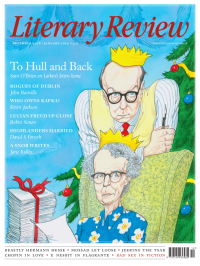Anne Somerset
Marriage Plots
Rival Queens: The Betrayal of Mary, Queen of Scots
By Kate Williams
Hutchinson 407pp £25
Devices & Desires: Bess of Hardwick and the Building of Elizabethan England
By Kate Hubbard
Chatto & Windus 354pp £20
With so much in common, Mary, Queen of Scots, and Queen Elizabeth I of England should have felt a mutual affinity, but they were fated to be bitter rivals. The enmity between the two female rulers was partly a consequence of Mary being manipulated and abused by her three husbands, who each in different ways brought her into confrontation with Elizabeth. If only, as Mary once jokingly remarked, they could have married each other, things might have been different. As it was, Mary’s marital history amply vindicated Elizabeth’s decision to remain forever single.
In 1558 Mary, aged fifteen, married Francis, eldest son of King Henry II of France. Their brief time as husband and wife appeared happy, but the union had disastrous implications for Scotland. Prior to the wedding, her father-in-law forced Mary to sign documents bequeathing her kingdom and its revenues to France if she died childless. Worse still, in November 1558, Henry II formally proclaimed his daughter-in-law queen of England, effectively rejecting the right of Elizabeth Tudor to succeed to the throne. Henceforth, Elizabeth would always see Mary as a would-be usurper.
When Mary was widowed in 1560 and decided to return to Scotland, establishing friendly relations with England proved challenging. Elizabeth indicated that she would view it as a hostile act if Mary married another great prince who would champion anew her claim to the English throne, but when

Sign Up to our newsletter
Receive free articles, highlights from the archive, news, details of prizes, and much more.@Lit_Review
Follow Literary Review on Twitter
Twitter Feed
It wasn’t until 1825 that Pepys’s diary became available for the first time. How it was eventually decrypted and published is a story of subterfuge and duplicity.
Kate Loveman tells the tale.
Kate Loveman - Publishing Pepys
Kate Loveman: Publishing Pepys
literaryreview.co.uk
Arthur Christopher Benson was a pillar of the Edwardian establishment. He was supremely well connected. As his newly published diaries reveal, he was also riotously indiscreet.
Piers Brendon compares Benson’s journals to others from the 20th century.
Piers Brendon - Land of Dopes & Tories
Piers Brendon: Land of Dopes & Tories - The Benson Diaries: Selections from the Diary of Arthur Christopher Benson by Eamon Duffy & Ronald Hyam (edd)
literaryreview.co.uk
Of the siblings Gwen and Augustus John, it is Augustus who has commanded most attention from collectors and connoisseurs.
Was he really the finer artist, asks Tanya Harrod, or is it time Gwen emerged from her brother’s shadow?
Tanya Harrod - Cut from the Same Canvas
Tanya Harrod: Cut from the Same Canvas - Artists, Siblings, Visionaries: The Lives and Loves of Gwen and Augustus John by Judith Mackrell
literaryreview.co.uk